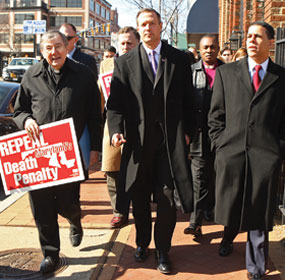They marched through the streets of Annapolis, carrying red-and-white signs reading, “Repeal Maryland’s Death Penalty.”
They stood in front of the State House next to a statue of Thurgood Marshall, beneath curved concrete slabs that said, “Equal Justice Under Law.” At the center of the 100 clergy members – and at the center of the effort to repeal the death penalty – stood Gov. Martin J. O’Malley.
If death penalty opponents felt a sense of déjà vu at the Annapolis prayer breakfast and march Feb. 25, they had good reason: They say they’ve come close to repeal for three years now – and have been lobbying for it for at least a decade.
This year, however, for the first time since the death penalty was reinstated in 1978, the full Senate is debating repeal.
As The Catholic Review went to press March 3, the repeal bill headed to the floor after senators, in a rare procedural move, voted 25-22 to throw out the Senate Judicial Proceedings Committee’s unfavorable recommendation on the measure.
The Senate last employed the procedural move in 1978 on the legislation that reinstated Maryland’s death penalty.
The bill’s advancement heartened repeal proponents.
“Senators are taking a close look at it and want the opportunity to hear and to learn more about it and be heard on it,” said Mary Sullivan, a spokeswoman for the Maryland Catholic Conference, legislative lobbying arm of the state’s Catholic bishops.
“It’s a great credit to all those folks who contacted their senators and urged them to give this bill an opportunity to be debated by the full Senate.”
Gov. O’Malley expressed gratitude to Senate President Thomas V. “Mike” Miller Jr. and other senators.
Former Govs. Parris N. Glendening and Harry R. Hughes called for repeal just before the Senate’s March 3 vote. Mr. Glendening, who is Catholic, oversaw two of the state’s five recent executions but said he has concluded the risk of executing an innocent person is too great to maintain capital punishment.
Gov. O’Malley said before the committee’s vote that he was hopeful the bill would win the 24 votes needed for Senate passage and, if necessary, 29 to break a possible filibuster.
“We want this issue resolved; we don’t want it obstructed,” Gov. O’Malley told about 100 clergy members after the Annapolis prayer breakfast and march.
After the march, Gov. O’Malley, who is Catholic, told the clergy members: “It is very rare that we address an issue that reaches so deeply into the soul of our state as does this issue of state-sponsored death, state-sponsored executions. “This is one of the defining moral issues of our time.”
Gov. O’Malley, like other death penalty opponents, pointed to the findings of a state death penalty commission, which recommended in December that state executions be banned.
The Maryland Commission on Capital Punishment concluded that the death penalty poses a serious risk of executing innocent people; racial and geographical disparities exist in capital cases; and executions cost much more than sentences of life without parole.
Standing alongside the governor, Auxiliary Bishop Denis J. Madden called on lawmakers to repeal the death penalty.
“We urge all of our lawmakers to act not simply out of political, practical and legal considerations,” Bishop Madden said. “We urge them … to listen truthfully to the voice of their moral conscience.
Bishop Madden, who served on the death penalty commission, said the church’s opposition goes beyond concerns about bias, deterrence, cost-effectiveness or executing an innocent person.
“Our church’s longstanding advocacy for death penalty repeal in Maryland rests upon our consistent advocacy for laws that respect all human life, even that of the convicted criminal,” he said.


